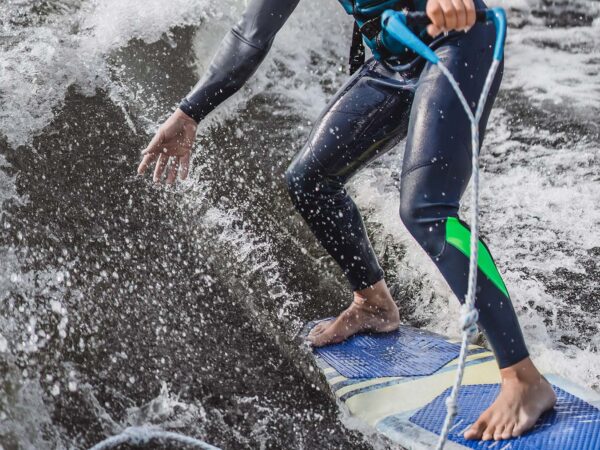Imagine the water being so calm that sliding through it along with your breath would give the same sense of peace. Paddleboarding is not just a body activity, but it is also an approach to get a mentally good state. This article will give the readers insight into how paddleboarding fights stress, improves the mood, and boosts focus.
Before we dive in, don’t miss out — join our exclusive SUP Facebook Group today! Whether you’re a beginner or looking to level up, our expert team is here to guide you every step of the way. Click here to become part of the Learn to Surf Maui SUP family — your adventure starts now!
How to Brighten Up Your Mood with Paddle Boarding
Paddle boarding is a unique combination of physical activity and exposure to the environment that can not only benefit us physically but also aid in our mental aspects.
Positive Vibes
Paddle boarding is a way to effectively remove yourself from daily stress and escape to the calm and quiet of the sea, while the rhythmic pulsation of the paddles helps to increase the sereneness and to chat down the anxiety. This manifestation of the “Blue Mind Theory” contends that the closeness to water triggers a relaxed reaction in the human mind, therefore mental wellness is blooming.
Active Self-Awareness
Getting the balance on a paddleboard calls for paying attention to the here and now. This automatic requirement of being fully present thus gives rise to an increase in the state of consciousness, as the paddlers will be paying attention to their processes and their environments, leading to mental clarity and feelings of the pressure being removed.
Affiliation with Nature
People who paddleboard, are exposed to outdoor surroundings, which are known to improve conditions in the case of both depression and anxiety. The act of moving through the water, with the scenes of nature around, can shift the individual’s focus to a peaceful condition, which in turn results in recovery and renewal.
Physical Activities for Joy and Happiness
Participating in paddle boarding, which is a full-body workout, means that different muscles are put into action, and this makes the body release natural mood-elevating agents. A reasonable degree of commitment can work wonders for one’s spirits and hearten one’s spirits, especially in the case of those who feel a little bit down.
Social Interaction
Even though paddleboarding in essence is a solo endeavor, it could still have a social component to it, and at the same time, one’s social life can very much benefit from this. As an example, engaging in group classes or clubs fosters a sense of belonging and welfare for one’s mental health. This in turn, results to boosted self confidence.
Learning the art of paddle boarding and tightening up the grip on the skills can raise self-confidence to a higher level. The obstacles faced on the water end up increasing the level of confidence in the way of life.
Alongside the benefits, paddleboarding introduces an additional dimension as far as psychological health is concerned, apart from the physical aspect; contemplation, and communication.
Reducing Stress and Anxiety
Paddle boarding serves as an antidote for stress naturally. Moving softly on water is a great way to relax, it is good for the mind. The paddling rhythm which one can create is also a kind of the best relaxing songs, which are able to calm and massage a person. Stress in the muscles is removed in the process thus, relaxation starts.
Spending your time in water makes you reduces the stress system – cortisol. The noise of the sea (waves) and the view of the water (open spaces) create a sense of calm. This calms people down, and they become less tense and more positive emotionally.
One’s attention is shifted from fearful thoughts to the challenge of staying steady, thus the mind is kept focused on the here and now instead of it becoming overactive and tired. It is the concentration required in order to maintain the equilibrium which minimizes brain activity, preventing is the person from thinking too much and getting the mind tired.
Getting fresh air and sunshine are the big guns in mood boosting. Natural light exposure works because it increases the level of the hormone serotonin, a hormone that works to increase our happiness. Being outdoor is also beneficial as it acts against the stressors of daily life.
Paddleboarding also can enter the state of meditation. The same as in relaxing so much, paddling can be named as it reduces anxiety if it is done along with deep breathing. Besides, it facilitates the brain to remain focused and clear therefore more productive.
Repeated practice of paddleboarding is for coping with stress not just in the short-term, but also in the long run. It is the combination of activity, mother nature, and attention that becomes the magic wand in treating mental problems. That makes regular Relaxing Paddles perfect for preserving inner peace.
Enhancing Focus and Mindfulness
The concentration level is very high when you are paddle boarding. Maintaining balance and controlling movements requires focus, which brings the mind to the present moment. Consequently, concentration and clarity of mind will improve.
The paddle movement’s flow has a calming effect on the mind, and this therefore encourages mindfulness. Every stroke, just as a balance transition, gives rise to a meditative stream. This way, mental buzz is silenced and a state of relaxed awareness is set in the practice of mindful paddling.
Once a person gets out on the water, he/she get rid of distractions from daily routines. There is no way that phone notifications or background noise can find their way to the water; just the sound of the paddle moving through the water. Consequently, this creates mental focus and relaxation at a deep level.
The capriciousness of the elements makes reflexes razor sharp. Riding the waves, coping with the wind, and mastering currents not only help to adapt the mind quickly but also enrich the cognitive abilities. The result is the improvement of flexibility and decision-making skills.
Mindfulness acquired from SUPboarding is not restricted to water only. The existence of calmer and more focused brainpower also leads to the enhancement of one’s mental resilience. It has the potential to reduce stress and anxiety, raise productivity, and restore emotional balance.
By going on paddle board training very often, one develops a habit of mindfulness. With such regular practice, the person is more likely to stay present, both on the board and off during their daily life.
Boosting Mood and Fighting Depression
Stand-up paddle boarding is a great helper for improving the overall psychological state of a person. Physical movement makes the body produce endorphins, the happiness hormones of the body. These chemicals then bring down the level of sorrow and intensify the degree of happiness.
By being on the water, one is able to improve relaxation. The gentle paddling movement and the sound of the waves bring a calming effect to the environment. This then leads to a reduction of the stress level and to the increase of one’s emotional well-being.
The sunlight that is met during paddle boarding also brings the vitamin D level to its peak. Vitamin D is essential in the regulation of the mood of a person and the prevention of depression. So, one way to save him/herself from SAD may be the natural environment and paddle boarding.
Deep breathing is a by-product of paddle boarding. Fresh air and the control over the breathing process improve the body’s oxygen supply and hence it is beneficial to the brain. This results in a clean mind, and thus the reduction of stress and an enhancement of concentration occur.
A small goal achieved at a time can serve as a stimulus for self-starting and self-perfection. Such a small goal may be the mastering of balance on a board or a successful longer distance paddle. Each small success is the reinforcement of the pleasure of success that in its turn leads to a stronger will to act and a brighter future.
The communicative feature of the environment has been proven to be a very good way to restore oneself to health. The results obtained from experiments clearly show that spending time in or around the place that is well-supplied with water is likely to eliminate the signs of depression. The peacefulness of the setting attracts to a large extent one’s sentimental and spiritual aspect and wakes them up.
Frequent paddle boarding supports the formation of a positive mindset. It may be said that physical activities while being on the water and being under the teaching mind dismiss all negative thoughts permanently out of one’s head and produce a healthy atmosphere of joy, mirth, and fun culture.
Building Confidence and Resilience
Paddleboarding is both an art and a science. The ability to stand on the board is itself a matter of patience and constancy. Every little achievement is a building block of self-confidence and a sense of something.
Conquering your fears of the sea can be taken as an example of the improvement of not only physical strength but also mental abilities. Fighting against the waves, regulating yourself for the wind, and dealing with the currents make you flexible. These are the same skills that will help you with life obstacles such as stress and uncertainty.
When you take control of this matter, you enhance your self-reliance. With the skill level improvements, the paddlers feel more self-sufficient and capable. What is more, this confidence is transferable and helpful in other activities of life.
Experimenting with your new skills in turn fosters a growth attitude within you. Perfecting turns, increasing speed, or paddling in different conditions are indicators of you as a person with ongoing learning. The same mindset helps with your personal and professional development.
It is like life- one falls and rises again every day. For every time one falls and still tries again, one builds his or her perseverance. This perseverance in coping with obstacles works with both the mind and the heart.
Not only reflection on nature but also self-reflection happens during this time. One’s running dialogue with the water and his/her moving limbs make his/her soul open and grow. This personal growth also leads to emotional awareness and inner strength.
Paddleboarding can bring a sense of personal achievement through skill development. Whether you paddle long distances or simply remain stable in choppy waters, your progress will result in increased self-confidence. It is the self-confident growth that goes hand in hand with resilience during the boring elements of life.
Social Connection and Community Bonding
Stand up paddle boarding is an activity that can easily be shared with others, and it gives a whole lot more fun when shared. Accompanying someone on the board, or joining the group paddle class, or taking part in events – such communal activities lead to the establishment of social bonds, inspire a sense of belonging, and hence favor a good mood in general.
Being part of the local paddleboarding group is one way you can prevent the onset of loneliness and feel good about it. It was shown that joining individuals with similar interests can lift one’s spirit and hence get the person in a better mood.
Each member’s participation in group paddle boarding not only saves energy but also lets the team have the chance to perform team exercises. Those who carry out the squad work, that is, stepping at the same time, helping to balance, and sharing events form a mutual connection and are likely to act as friends.
Leveraging the experience of others helps the learner to be skilled and full of confidence. The presence of an expert, identifying similar areas of strength, as well as their capacity having been increased, leads the student to the sports more satisfying and fun.
Connecting with friends while surrounded by nature brings about relaxation. The nature of the out-of-the-house engagement and the lack of loud noises, busy work, and densely populated areas all contribute to the calming effect of nature, making human interactions even more genuine and less stressful.
Besides, participating in paddleboarding events serves as a motivation booster. Once they participate in races, charity paddles, or group tours, they get a purpose to strive, which gives a person an enhanced sense of confidence, self-worth, and an increase in one’s abilities.
Supporting other individuals creates strong interpersonal relationships. Sharing empathy with a friend who is going through hard times or assisting a new learner in their first steps leads to the construction of resilient communication-dotted relationships often marked by acts of kindness, respect, and mutual trust.
One of the great family bonding experiences out there is paddle boarding. It’s never too late for parents, children, and couples to take their paddleboards and retreat in order to spend some quality time enjoyably, while keeping fit.
Using stand-up paddleboarding to establish a connection is more than just being in the water. The people that you have met on the paddleboard will generally end you with more robust social networks and a richer lifestyle.
The Physical-Mental Connection
Stand-up paddleboarding is a sporting activity that is beneficial to your health benefiting both your physique and your mental well-being. The performance of some physical activity favors a person’s mental state, additionally burning off stress and cooling down the mood.
Being on the board is a workout during which the stomach muscles have to be utilized. A highly developed core not only improves body posture but also prevents physical strain, which then gets rid of mental stress. Paddling is a full-body movement. The limbs, legs, and core are the main ingredients that produce blood circulation. The blood movement also improves oxygen supplies to the brain. The better circulation results in the brain receiving more oxygen, and in turn, reflects in increased concentration and mental clarity.
Regular exercises raise the levels of the so-called “feel-good” hormones in the organism. These “feel-good” hormones not only relax but also are responsible for the lack of any depression, which consequently causes great and lasting joy.
By the water briskly going past, the paddling motion makes breathing controlled and self-regulated, helping the motor nerve system. The nervous system is calm and pacified by the deep, regular breaths, which also bring lower heart rates; thus, stress is effectively managed.
Staying power exercises by using a board on the water gradually foster a strong mind. It is by moderate physical challenges and the feeling of tiredness that one’s character is bolstered and one’s indestructibility is increased.
Having much time in the open air makes people feel chirpy and more alive. The sun is responsible for serotonin, a chemical that decreases stress and increases feelings of happiness.
Feeling the water’s flow will automatically bring peace and tranquility. From one piece of research to another, it becomes explicit that by merely being close to water, cortisol production is diminished and as a result, less stress is found, and inner peace is promoted.
A sound body can only result in a sound mind. Paddleboarding means better and deeper sleep, higher energy, and emotional balance.
Combining physical activity, meditation, and surrounding oneself with the outdoors, paddle boarding becomes a great method for mental health and wellness. It is a way of training both our mental and physical strength, hence giving us a chance to live a happy life filled with good health.
Encouraging a Balanced Lifestyle
Stand up paddleboarding is an activity that promotes an equilibrium and healthy living. The trio of activity, relaxation, and outdoor activity acts as a perfect method for individuals to possess not only good mental health but also physical health.
Regular paddling enables loyalty to the water and natural light, which are the two most radical things. Not thinking about work while being in this state allows people to be free from stress that shifts their minds from relaxation. With the result of a lesser fatigue level, people can then direct their attention more smartly than before.
The sport itself is an organic part of a mindfulness-based fitness program. The necessity to balance and to control the movement is established as psychophysical mindfulness, which increases the level of our awareness, and eventually takes us to a point where we can face life confidently instead of trembling and shivering.
One will grow their respect for the environmental by participating in paddling. People spend quality time on the water which often makes them choose a healthier lifestyle like healthy eating habits, being well-hydrated, and preferring the self rather than others, among others.
The activity is not only good for mental and physical health in the short run but also quite sustainable in the long run. It is a full-body workout without injury and pain, unlike other high-impact sports. So, we can consider it for a long time, especially for the elderly.
At the same time, this water sport compels one to lead an orderly life and in fact, should help in making discipline a part of one’s character. One can keep on moving, e.g., setting better targets, learning new ways of maneuvering the balance boat, and paddling away further, etc.
The activity is suitable for everyone, regardless of the kind of lifestyle they lead. Paddleboarding is for someone in search of relaxation, the adventurer who loves new places, or the person interested in keeping fit. It is, without question, a very accommodating sport for everyone to engage in and feel excited about staying active.
On the whole, paddle boarding is something more than just a sport – it is the first step to a better, balanced life. Doing something that involves sports, the outdoors, and focused awareness results in better health for a person and more happiness and fulfillment when being with others.





